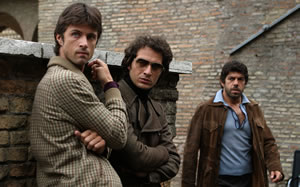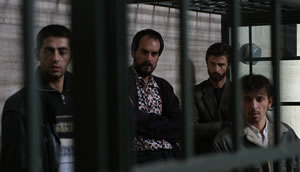Romanzo Criminale
Dir: Michele Pacido
Cast: Kim Rossi Stuart, Pierfrancesco Favino, Claudio Santamaria, Anna Mouglalis
Italy/France/UK, 150 mins, Italian (with subtitles)
Culturally, Italy is one of Europe's richest countries, but it is also one of its most corrupt. Even though most people enjoy a reasonable quality of life and the support of the extended family unit, the social disparity brought about by a lack of welfare state means that crime has often been the career path of the disaffected youths. The fact that crime is rife in every strata of society, particularly in Rome and the south of Italy, meant that violence was often the easiest way to fulfil ambitions. Romanzo Criminale is the story of ambition, love and revenge, set in one of the most incendiary periods of contemporary Italian history.

The film opens with four boys stealing a car and running down a policeman, which leads to two of them being jailed. Flash forward to the Seventies and three of them are reunited and decide to establish themselves as leaders in Rome's underworld of drugs and prostitution. Ice/Freddo (Rossi Stuart), Lebanese (Favino) and Dandy (Santamaria) are clinical and brutal in their ambitions, achieving their goals with ferocity and the occasional aid of a mysterious bureaucrat. As major events in Italian history unfold (the kidnapping of Aldo Moro, the bombing of Bologna Station), in which out anti-heroes may or may not be involved, they are relentlessly pursued by Commissario Scialoja (Stefano Accorsi) of the Forze dell'Ordine (police). Scialoja is also pursuing Patrizia (Mouglalis), a high-class prostitute and Dandy's girlfriend, but not just for her criminal activities and associations.

Apart from Scialoja's illicit affair, there are moments of love and tenderness amongst the violence and power struggles. Freddo falls for his brother's innocent tutor, Roberta, which gives new depth and warmth to an otherwise cold and ruthless character. But don't let the film's title fool you into thinking this film is a romantic look at criminals. Romanzo Criminale translates as Crime Novel, - these are commonly referred to as gialli in Italy, because they have yellow covers, and are the equivalent of what we know as pulp fiction.
Parallels can be drawn between this film and Tarantino's eponymous masterpiece, as both have their gang violence and episodic, intertwined stories, but Romanzo Criminale is more comparable with Goodfellas (1990) and its story of the rise of three street punks through the ranks of organised crime. Scorsese's film is undoubtedly a classic of the genre but very much a product of American cinema, whereas Romanzo Criminale's roots are in the streets of Rome. The Italian is spoken with such thick regional accents that even for those who understand Italian it can often be hard to follow what is being said, and although the subtitles are distracting and never fully capture the onscreen dialogue, they do help.

The external changes (clothing, vehicles, architecture) in Italy are not as marked as those we are used to in American films covering the same period, but the film's colour grading alters to reflect the passage of time. The integration of actual news footage into the film, done to excellent effect with the Bologna Station explosion, along with the soundtrack, also help establish a recognisable timeline, or at least for those familiar with Italian history.
Although this film may never achieve the status of Goodfellas, it is a worthy adversary that is both well-acted and well-directed.
Romanzo Criminale is showing at the London Film Festival on October 31 and November 1 at Odeon West End and on general release from November 3.
Cast: Kim Rossi Stuart, Pierfrancesco Favino, Claudio Santamaria, Anna Mouglalis
Italy/France/UK, 150 mins, Italian (with subtitles)
Culturally, Italy is one of Europe's richest countries, but it is also one of its most corrupt. Even though most people enjoy a reasonable quality of life and the support of the extended family unit, the social disparity brought about by a lack of welfare state means that crime has often been the career path of the disaffected youths. The fact that crime is rife in every strata of society, particularly in Rome and the south of Italy, meant that violence was often the easiest way to fulfil ambitions. Romanzo Criminale is the story of ambition, love and revenge, set in one of the most incendiary periods of contemporary Italian history.

The film opens with four boys stealing a car and running down a policeman, which leads to two of them being jailed. Flash forward to the Seventies and three of them are reunited and decide to establish themselves as leaders in Rome's underworld of drugs and prostitution. Ice/Freddo (Rossi Stuart), Lebanese (Favino) and Dandy (Santamaria) are clinical and brutal in their ambitions, achieving their goals with ferocity and the occasional aid of a mysterious bureaucrat. As major events in Italian history unfold (the kidnapping of Aldo Moro, the bombing of Bologna Station), in which out anti-heroes may or may not be involved, they are relentlessly pursued by Commissario Scialoja (Stefano Accorsi) of the Forze dell'Ordine (police). Scialoja is also pursuing Patrizia (Mouglalis), a high-class prostitute and Dandy's girlfriend, but not just for her criminal activities and associations.

Apart from Scialoja's illicit affair, there are moments of love and tenderness amongst the violence and power struggles. Freddo falls for his brother's innocent tutor, Roberta, which gives new depth and warmth to an otherwise cold and ruthless character. But don't let the film's title fool you into thinking this film is a romantic look at criminals. Romanzo Criminale translates as Crime Novel, - these are commonly referred to as gialli in Italy, because they have yellow covers, and are the equivalent of what we know as pulp fiction.
Parallels can be drawn between this film and Tarantino's eponymous masterpiece, as both have their gang violence and episodic, intertwined stories, but Romanzo Criminale is more comparable with Goodfellas (1990) and its story of the rise of three street punks through the ranks of organised crime. Scorsese's film is undoubtedly a classic of the genre but very much a product of American cinema, whereas Romanzo Criminale's roots are in the streets of Rome. The Italian is spoken with such thick regional accents that even for those who understand Italian it can often be hard to follow what is being said, and although the subtitles are distracting and never fully capture the onscreen dialogue, they do help.

The external changes (clothing, vehicles, architecture) in Italy are not as marked as those we are used to in American films covering the same period, but the film's colour grading alters to reflect the passage of time. The integration of actual news footage into the film, done to excellent effect with the Bologna Station explosion, along with the soundtrack, also help establish a recognisable timeline, or at least for those familiar with Italian history.
Although this film may never achieve the status of Goodfellas, it is a worthy adversary that is both well-acted and well-directed.
Romanzo Criminale is showing at the London Film Festival on October 31 and November 1 at Odeon West End and on general release from November 3.

0 Comments:
Post a Comment
<< Home